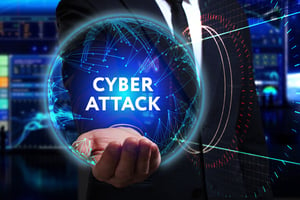 Think back to 20 years ago. While we had cellphones, we didn't use them for email, online shopping, surfing the web or social media. That was all reserved for our computers, which were bulky desktops or heavy laptops that were hardly portable. Today, nearly every aspect of our life is online in one way or another. Whether it's paying your bills, banking or ordering groceries, all of these things utilize something called Personally Identifiable Information or PII. PII refers to credit card numbers, social security numbers, addresses and telephone numbers, and when you order that hot new gadget or pay your car loan, you are putting that PII out there for cyberhackers to grab. And that is what National Cybersecurity Awareness Month aims to do - inform you on how to best protect yourself, your family and your business from cyberattacks.
Think back to 20 years ago. While we had cellphones, we didn't use them for email, online shopping, surfing the web or social media. That was all reserved for our computers, which were bulky desktops or heavy laptops that were hardly portable. Today, nearly every aspect of our life is online in one way or another. Whether it's paying your bills, banking or ordering groceries, all of these things utilize something called Personally Identifiable Information or PII. PII refers to credit card numbers, social security numbers, addresses and telephone numbers, and when you order that hot new gadget or pay your car loan, you are putting that PII out there for cyberhackers to grab. And that is what National Cybersecurity Awareness Month aims to do - inform you on how to best protect yourself, your family and your business from cyberattacks.
Back in 2004, the Department of Homeland Security and the National Cyber Security Alliance began National Cybersecurity Month to educate the public about Internet safety. When it first began, the messages were reminders to update your anti-virus software. With the shift in sophistication of cyber threats, much of the education provided today focuses on protecting your information from hackers and staying safe while online. The theme of this year's National Cybersecurity Month is "Own IT. Secure IT. Protect IT." This messaging is focused on "encouraging personal accountability and proactive behavior in security best practices, digital privacy and draw attention to careers in cybersecurity." So how can your incorporate this into your business? Let's take a deeper look.
As we all know, devices connected to the internet help us run significant parts of our lives. Whether it's the iPad we read books on, the SmartTV on which we watch NetFlix or the smartphone we text our children on, these devices are always connected to the web. With this "always on" connection, our information is more readily available to cybercriminals. Understanding your devices and apps you use every day and how your data is being stored and used will help you to stay safe and secure online. Take time to learn about your privacy settings on devices and make sure you're using them in their most effective manner.
A lot of people who are compromised in a cybersecurity attack are often just unsuspecting victims. They think a data breach won't happen to them, or they won't fall victim to identity theft. In today's cybersecurity environment, it's not a matter of if an attack will happen, but when. It's more important than ever to keep your devices secure. That means completing updates on devices in a timely manner to ensure security settings are up to date. It includes enacting multi-factor authentication on your important information to add an extra layer of protection. One example of securing devices is to password-protect your smartphones and tablets. Research from Kaspersky Lab found that 52 percent of people do not password-protect their mobile devices and only 22 percent of consumers use anti-theft solutions on their phone. In today's world, that's basically like leaving your front door unlocked 24 hours a day, 7 days a week, and hoping nobody comes in your house. Take the time to create a strong password for your devices and implement multi-factor authentication whenever possible to protect your valuable information.
Whether you just have an email account and pay bills online, or you have a profile on every social media platform, everyone, in some form or another, has a digital profile. That digital profile needs to be protected so that your identity is protected. Every time you like a post, send an email or buy a new pair of shoes, you leave a digital trail that cybercriminals can find. It is your responsibility to be familiar with your privacy settings and know how to keep your information safe. Always be aware of what and where you're leaving that trail of information, and be sure to check your digital profile regularly to ensure what is listed is true and valid.
Throughout the month, Fraser will provide you with resources and information to help you and your business stay safe and protected online. Check back all month to learn more about how you can protect your valuable business data from cyberattacks.
